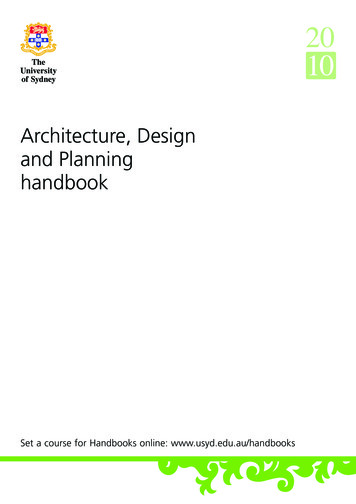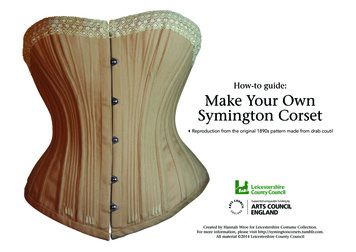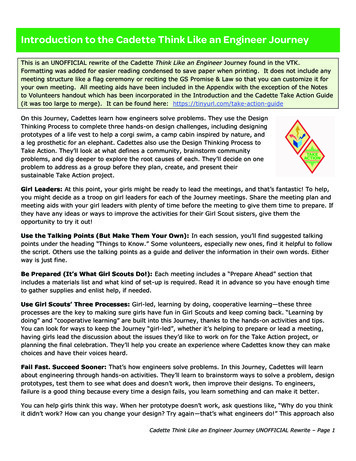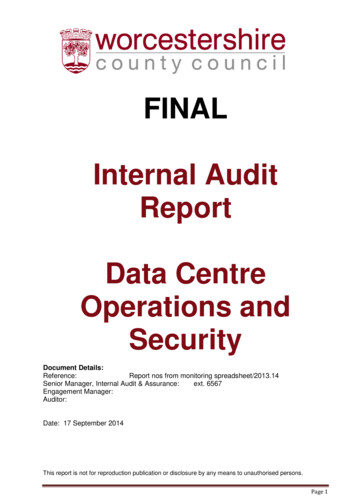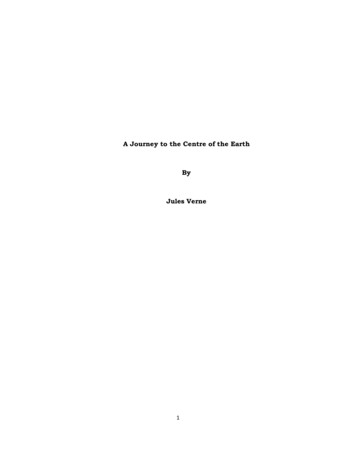
Transcription
A Journey to the Centre of the EarthByJules Verne1
TABLE OF CONTENTSCHAPTER 1 MY UNCLE MAKES A GREAT DISCOVERYCHAPTER 2 THE MYSTERIOUS PARCHMENTCHAPTER 3 AN ASTOUNDING DISCOVERYCHAPTER 4 WE START ON THE JOURNEYCHAPTER 5 FIRST LESSONS IN CLIMBINGCHAPTER 6 OUR VOYAGE TO ICELANDCHAPTER 7 CONVERSATION AND DISCOVERYCHAPTER 8 THE EIDER-DOWN HUNTER--OFF AT LASTCHAPTER 9 OUR START--WE MEET WITH ADVENTURES BY THE WAYCHAPTER 10 TRAVELING IN ICELANDCHAPTER 11 WE REACH MOUNT SNEFFELS--THE "REYKIR"CHAPTER 12 THE ASCENT OF MOUNT SNEFFELS2
CHAPTER 13 THE SHADOW OF SCARTARISCHAPTER 14 THE REAL JOURNEY COMMENCESCHAPTER 15 WE CONTINUE OUR DESCENTCHAPTER 16 THE EASTERN TUNNELCHAPTER 17 DEEPER AND DEEPER--THE COAL MINECHAPTER 18 THE WRONG ROAD!CHAPTER 19 THE WESTERN GALLERY--A NEW ROUTECHAPTER 20 WATER, WHERE IS IT? A BITTER DISAPPOINTMENTCHAPTER 21 UNDER THE OCEANCHAPTER 22 SUNDAY BELOW GROUNDCHAPTER 23 ALONECHAPTER 24 LOST!CHAPTER 25 THE WHISPERING GALLERY3
CHAPTER 26 A RAPID RECOVERYCHAPTER 27 THE CENTRAL SEACHAPTER 28 LAUNCHING THE RAFTCHAPTER 29 ON THE WATERS--A RAFT VOYAGECHAPTER 30 TERRIFIC SAURIAN COMBATCHAPTER 31 THE SEA MONSTERCHAPTER 32 THE BATTLE OF THE ELEMENTSCHAPTER 33 OUR ROUTE REVERSEDCHAPTER 34 A VOYAGE OF DISCOVERYCHAPTER 35 DISCOVERY UPON DISCOVERYCHAPTER 36 WHAT IS IT?CHAPTER 37 THE MYSTERIOUS DAGGERCHAPTER 38 NO OUTLET--BLASTING THE ROCK4
CHAPTER 39 THE EXPLOSION AND ITS RESULTSCHAPTER 40 THE APE GIGANSCHAPTER 41 HUNGERCHAPTER 42 THE VOLCANIC SHAFTCHAPTER 43 DAYLIGHT AT LASTCHAPTER 44 THE JOURNEY ENDED5
CHAPTER 1MY UNCLE MAKES A GREAT DISCOVERYLooking back to all that has occurred to me since that eventful day, Iam scarcely able to believe in the reality of my adventures. They weretruly so wonderful that even now I am bewildered when I think of them.My uncle was a German, having married my mother's sister, anEnglishwoman. Being very much attached to his fatherless nephew, heinvited me to study under him in his home in the fatherland. This homewas in a large town, and my uncle a professor of philosophy, chemistry,geology, mineralogy, and many other ologies.One day, after passing some hours in the laboratory--my uncle beingabsent at the time--I suddenly felt the necessity of renovating thetissues-- i i.e. /i , I was hungry, and was about to rouse up our old Frenchcook, when my uncle, Professor Von Hardwigg, suddenly opened the streetdoor, and came rushing upstairs.Now Professor Hardwigg, my worthy uncle, is by no means a bad sort ofman; he is, however, choleric and original. To bear with him means toobey; and scarcely had his heavy feet resounded within our jointdomicile than he shouted for me to attend upon him.6
"Harry--Harry--Harry--"I hastened to obey, but before I could reach his room, jumping threesteps at a time, he was stamping his right foot upon the landing."Harry!" he cried, in a frantic tone, "are you coming up?"Now to tell the truth, at that moment I was far more interested in thequestion as to what was to constitute our dinner than in any problem ofscience; to me soup was more interesting than soda, an omelette moretempting than arithmetic, and an artichoke of ten times more value thanany amount of asbestos.But my uncle was not a man to be kept waiting; so adjourning thereforeall minor questions, I presented myself before him.He was a very learned man. Now most persons in this category supplythemselves with information, as peddlers do with goods, for the benefitof others, and lay up stores in order to diffuse them abroad for thebenefit of society in general. Not so my excellent uncle, ProfessorHardwigg; he studied, he consumed the midnight oil, he pored over heavytomes, and digested huge quartos and folios in order to keep theknowledge acquired to himself.There was a reason, and it may be regarded as a good one, why my uncleobjected to display his learning more than was absolutely necessary: he7
stammered; and when intent upon explaining the phenomena of the heavens,was apt to find himself at fault, and allude in such a vague way to sun,moon, and stars that few were able to comprehend his meaning. To tellthe honest truth, when the right word would not come, it was generallyreplaced by a very powerful adjective.In connection with the sciences there are many almost unpronounceablenames--names very much resembling those of Welsh villages; and my unclebeing very fond of using them, his habit of stammering was not therebyimproved. In fact, there were periods in his discourse when he wouldfinally give up and swallow his discomfiture--in a glass of water.As I said, my uncle, Professor Hardwigg, was a very learned man; and Inow add a most kind relative. I was bound to him by the double ties ofaffection and interest. I took deep interest in all his doings, andhoped some day to be almost as learned myself. It was a rare thing forme to be absent from his lectures. Like him, I preferred mineralogy toall the other sciences. My anxiety was to gain real i knowledge of theearth /i . Geology and mineralogy were to us the sole objects of life, andin connection with these studies many a fair specimen of stone, chalk,or metal did we break with our hammers.Steel rods, loadstones, glass pipes, and bottles of various acids wereoftener before us than our meals. My uncle Hardwigg was once known toclassify six hundred different geological specimens by their weight,hardness, fusibility, sound, taste, and smell.8
He corresponded with all the great, learned, and scientific men of theage. I was, therefore, in constant communication with, at all events theletters of, Sir Humphry Davy, Captain Franklin, and other great men.But before I state the subject on which my uncle wished to confer withme, I must say a word about his personal appearance. Alas! my readerswill see a very different portrait of him at a future time, after he hasgone through the fearful adventures yet to be related.My uncle was fifty years old; tall, thin, and wiry. Large spectacleshid, to a certain extent, his vast, round, and goggle eyes, while hisnose was irreverently compared to a thin file. So much indeed did itresemble that useful article, that a compass was said in his presence tohave made considerable N (Nasal) deviation.The truth being told, however, the only article really attracted to myuncle's nose was tobacco.Another peculiarity of his was, that he always stepped a yard at a time,clenched his fists as if he were going to hit you, and was, when in oneof his peculiar humors, very far from a pleasant companion.It is further necessary to observe that he lived in a very nice house,in that very nice street, the Konigstrasse at Hamburg. Though lying inthe centre of a town, it was perfectly rural in its aspect--half wood,9
half bricks, with old-fashioned gables--one of the few old houses sparedby the great fire of 1842.When I say a nice house, I mean a handsome house--old, tottering, andnot exactly comfortable to English notions: a house a little off theperpendicular and inclined to fall into the neighboring canal; exactlythe house for a wandering artist to depict; all the more that you couldscarcely see it for ivy and a magnificent old tree which grew over thedoor.My uncle was rich; his house was his own property, while he had aconsiderable private income. To my notion the best part of hispossessions was his god-daughter, Gretchen. And the old cook, the younglady, the Professor and I were the sole inhabitants.I loved mineralogy, I loved geology. To me there was nothing likepebbles--and if my uncle had been in a little less of a fury, we shouldhave been the happiest of families. To prove the excellent Hardwigg'simpatience, I solemnly declare that when the flowers in the drawing-roompots began to grow, he rose every morning at four o'clock to make themgrow quicker by pulling the leaves!Having described my uncle, I will now give an account of our interview.He received me in his study; a perfect museum, containing every naturalcuriosity that can well be imagined--minerals, however, predominating.10
Every one was familiar to me, having been catalogued by my own hand. Myuncle, apparently oblivious of the fact that he had summoned me to hispresence, was absorbed in a book. He was particularly fond of earlyeditions, tall copies, and unique works."Wonderful!" he cried, tapping his forehead. "Wonderful--wonderful!"It was one of those yellow-leaved volumes now rarely found on stalls,and to me it appeared to possess but little value. My uncle, however,was in raptures.He admired its binding, the clearness of its characters, the ease withwhich it opened in his hand, and repeated aloud, half a dozen times,that it was very, very old.To my fancy he was making a great fuss about nothing, but it was not myprovince to say so. On the contrary, I professed considerable interestin the subject, and asked him what it was about."It is the Heims-Kringla of Snorre Tarleson," he said, "the celebratedIcelandic author of the twelfth century--it is a true and correctaccount of the Norwegian princes who reigned in Iceland."My next question related to the language in which it was written. Ihoped at all events it was translated into German. My uncle wasindignant at the very thought, and declared he wouldn't give a penny for11
a translation. His delight was to have found the original work in theIcelandic tongue, which he declared to be one of the most magnificentand yet simple idioms in the world--while at the same time itsgrammatical combinations were the most varied known to students."About as easy as German?" was my insidious remark.My uncle shrugged his shoulders."The letters at all events," I said, "are rather difficult ofcomprehension.""It is a Runic manuscript, the language of the original population ofIceland, invented by Odin himself," cried my uncle, angry at myignorance.I was about to venture upon some misplaced joke on the subject, when asmall scrap of parchment fell out of the leaves. Like a hungry mansnatching at a morsel of bread the Professor seized it. It was aboutfive inches by three and was scrawled over in the most extraordinaryfashion.The lines shown here are an exact facsimile of what was written on thevenerable piece of parchment--and have wonderful importance, as theyinduced my uncle to undertake the most wonderful series of adventureswhich ever fell to the lot of human beings.12
My uncle looked keenly at the document for some moments and thendeclared that it was Runic. The letters were similar to those in thebook, but then what did they mean? This was exactly what I wanted toknow.Now as I had a strong conviction that the Runic alphabet and dialectwere simply an invention to mystify poor human nature, I was delightedto find that my uncle knew as much about the matter as I did--which wasnothing. At all events the tremulous motion of his fingers made me thinkso."And yet," he muttered to himself, "it is old Icelandic, I am sure ofit."And my uncle ought to have known, for he was a perfect polyglotdictionary in himself. He did not pretend, like a certain learnedpundit, to speak the two thousand languages and four thousand idiomsmade use of in different parts of the globe, but he did know all themore important ones.It is a matter of great doubt to me now, to what violent measures myuncle's impetuosity might have led him, had not the clock struck two,and our old French cook called out to let us know that dinner was on thetable.13
"Bother the dinner!" cried my uncle.But as I was hungry, I sallied forth to the dining room, where I took upmy usual quarters. Out of politeness I waited three minutes, but no signof my uncle, the Professor. I was surprised. He was not usually so blindto the pleasure of a good dinner. It was the acme of Germanluxury--parsley soup, a ham omelette with sorrel trimmings, an oyster ofveal stewed with prunes, delicious fruit, and sparkling Moselle. For thesake of poring over this musty old piece of parchment, my uncle forboreto share our meal. To satisfy my conscience, I ate for both.The old cook and housekeeper was nearly out of her mind. After taking somuch trouble, to find her master not appear at dinner was to her a saddisappointment--which, as she occasionally watched the havoc I wasmaking on the viands, became also alarm. If my uncle were to come totable after all?Suddenly, just as I had consumed the last apple and drunk the last glassof wine, a terrible voice was heard at no great distance. It was myuncle roaring for me to come to him. I made very nearly one leap ofit--so loud, so fierce was his tone.14
CHAPTER 2THE MYSTERIOUS PARCHMENT[Illustration: Runic Glyphs]"I Declare," cried my uncle, striking the table fiercely with his fist,"I declare to you it is Runic--and contains some wonderful secret, whichI must get at, at any price."I was about to reply when he stopped me."Sit down," he said, quite fiercely, "and write to my dictation."I obeyed."I will substitute," he said, "a letter of our alphabet for that of theRunic: we will then see what that will produce. Now, begin and make nomistakes."The dictation commenced with the following incomprehensible result:mm.rnlls esruel seecJdesgtssmf unteief niedrke15
kt,samn atrateS SaodrrnemtnaeI nuaect rrilSaAtvaar .nscrc ieaabsccdrmi eeutul frantudt,iac oseibo KediiYScarcely giving me time to finish, my uncle snatched the document frommy hands and examined it with the most rapt and deep attention."I should like to know what it means," he said, after a long period.I certainly could not tell him, nor did he expect me to--hisconversation being uniformly answered by himself."I declare it puts me in mind of a cryptograph," he cried, "unless,indeed, the letters have been written without any real meaning; and yetwhy take so much trouble? Who knows but I may be on the verge of somegreat discovery?"My candid opinion was that it was all rubbish! But this opinion I keptcarefully to myself, as my uncle's choler was not pleasant to bear. Allthis time he was comparing the book with the parchment."The manuscript volume and the smaller document are written in differenthands," he said, "the cryptograph is of much later date than the book;16
there is an undoubted proof of the correctness of my surmise. [Anirrefragable proof I took it to be.] The first letter is a double M,which was only added to the Icelandic language in the twelfthcentury--this makes the parchment two hundred years posterior to thevolume."The circumstances appeared very probable and very logical, but it wasall surmise to me."To me it appears probable that this sentence was written by some ownerof the book. Now who was the owner, is the next important question.Perhaps by great good luck it may be written somewhere in the volume."With these words Professor Hardwigg took off his spectacles, and, takinga powerful magnifying glass, examined the book carefully.On the fly leaf was what appeared to be a blot of ink, but onexamination proved to be a line of writing almost effaced by time. Thiswas what he sought; and, after some considerable time, he made out theseletters:[Illustration: Runic Glyphs]"Arne Saknussemm!" he cried in a joyous and triumphant tone, "that isnot only an Icelandic name, but of a learned professor of the sixteenthcentury, a celebrated alchemist."17
I bowed as a sign of respect."These alchemists," he continued, "Avicenna, Bacon, Lully, Paracelsus,were the true, the only learned men of the day. They made surprisingdiscoveries. May not this Saknussemm, nephew mine, have hidden on thisbit of parchment some astounding invention? I believe the cryptograph tohave a profound meaning--which I must make out."My uncle walked about the room in a state of excitement almostimpossible to describe."It may be so, sir," I timidly observed, "but why conceal it fromposterity, if it be a useful, a worthy discovery?""Why--how should I know? Did not Galileo make a secret of hisdiscoveries in connection with Saturn? But we shall see. Until Idiscover the meaning of this sentence I will neither eat nor sleep.""My dear uncle--" I began."Nor you neither," he added.It was lucky I had taken double allowance that day."In the first place," he continued, "there must be a clue to the18
meaning. If we could find that, the rest would be easy enough."I began seriously to reflect. The prospect of going without food andsleep was not a promising one, so I determined to do my best to solvethe mystery. My uncle, meanwhile, went on with his soliloquy."The way to discover it is easy enough. In this document there are onehundred and thirty-two letters, giving seventy-nine consonants tofifty-three vowels. This is about the proportion found in most southernlanguages, the idioms of the north being much more rich in consonants.We may confidently predict, therefore, that we have to deal with asouthern dialect."Nothing could be more logical."Now," said Professor Hardwigg, "to trace the particular language.""As Shakespeare says, 'that is the question,"' was my rather satiricalreply."This man Saknussemm," he continued, "was a very learned man: now as hedid not write in the language of his birthplace, he probably, like mostlearned men of the sixteenth century, wrote in Latin. If, however, Iprove wrong in this guess, we must try Spanish, French, Italian, Greek,and even Hebrew. My own opinion, though, is decidedly in favor ofLatin."19
This proposition startled me. Latin was my favorite study, and it seemedsacrilege to believe this gibberish to belong to the country of Virgil."Barbarous Latin, in all probability," continued my uncle, "but stillLatin.""Very probably," I replied, not to contradict him."Let us see into the matter," continued my uncle; "here you see we havea series of one hundred and thirty-two letters, apparently thrownpell-mell upon paper, without method or organization. There are wordswhich are composed wholly of consonants, such as i mm.rnlls /i , otherswhich are nearly all vowels, the fifth, for instance, which is unteief,and one of the last oseibo. This appears an extraordinary combination.Probably we shall find that the phrase is arranged according to somemathematical plan. No doubt a certain sentence has been written out andthen jumbled up--some plan to which some figure is the clue. Now, Harry,to show your English wit--what is that figure?"I could give him no hint. My thoughts were indeed far away. While he wasspeaking I had caught sight of the portrait of my cousin Gretchen, andwas wondering when she would return.We were affianced, and loved one another very sincerely. But my uncle,who never thought even of such sublunary matters, knew nothing of this.20
Without noticing my abstraction, the Professor began reading thepuzzling cryptograph all sorts of ways, according to some theory of hisown. Presently, rousing my wandering attention, he dictated one preciousattempt to me.I mildly handed it over to him. It read as follows: i mutabiledmekmeretarcsilucoYsleffenSnI. /i I could scarcely keep from laughing, while my uncle, on the contrary,got in a towering passion, struck the table with his fist, darted out ofthe room, out of the house, and then taking to his heels was presentlylost to sight.21
CHAPTER 3AN ASTOUNDING DISCOVERY"What is the matter?" cried the cook, entering the room; "when willmaster have his dinner?""Never.""And, his supper?""I don't know. He says he will eat no more, neither shall I. My unclehas determined to fast and make me fast until he makes out thisabominable inscription," I replied."You will be starved to death," she said.I was very much of the same opinion, but not liking to say so, sent heraway, and began some of my usual work of classification. But try as Imight, nothing could keep me from thinking alternately of the stupidmanuscript and of the pretty Gretchen.Several times I thought of going out, but my uncle would have been angryat my absence. At the end of an hour, my allotted task was done. How topass the time? I began by lighting my pipe. Like all other students, I22
delighted in tobacco; and, seating myself in the great armchair, I beganto think.Where was my uncle? I could easily imagine him tearing along somesolitary road, gesticulating, talking to himself, cutting the air withhis cane, and still thinking of the absurd bit of hieroglyphics. Wouldhe hit upon some clue? Would he come home in better humor? While thesethoughts were passing through my brain, I mechanically took up theexecrable puzzle and tried every imaginable way of grouping the letters.I put them together by twos, by threes, fours, and fives--in vain.Nothing intelligible came out, except that the fourteenth, fifteenth,and sixteenth made i ice /i in English; the eighty-fourth, eighty-fifth,and eighty-sixth, the word i sir /i ; then at last I seemed to find theLatin words i rota, mutabile, ira, nec, atra /i ."Ha! there seems to be some truth in my uncle's notion," thought I.Then again I seemed to find the word i luco /i , which means sacred wood.Then in the third line I appeared to make out i labiled /i , a perfectHebrew word, and at the last the syllables mere, are, mer, which wereFrench.It was enough to drive one mad. Four different idioms in this absurdphrase. What connection could there be between ice, sir, anger, cruel,sacred wood, changing, mother, are, and sea? The first and the lastmight, in a sentence connected with Iceland, mean sea of ice. But what23
of the rest of this monstrous cryptograph?I was, in fact, fighting against an insurmountable difficulty; my brainwas almost on fire; my eyes were strained with staring at the parchment;the whole absurd collection of letters appeared to dance before myvision in a number of black little groups. My mind was possessed withtemporary hallucination--I was stifling. I wanted air. Mechanically Ifanned myself with the document, of which now I saw the back and thenthe front.Imagine my surprise when glancing at the back of the wearisome puzzle,the ink having gone through, I clearly made out Latin words, and amongothers craterem and terrestre.I had discovered the secret!It came upon me like a flash of lightning. I had got the clue. All youhad to do to understand the document was to read it backwards. All theingenious ideas of the Professor were realized; he had dictated itrightly to me; by a mere accident I had discovered what he so muchdesired.My delight, my emotion may be imagined, my eyes were dazzled and Itrembled so that at first I could make nothing of it. One look, however,would tell me all I wished to know.24
"Let me read," I said to myself, after drawing a long breath.I spread it before me on the table, I passed my finger over each letter,I spelled it through; in my excitement I read it out.What horror and stupefaction took possession of my soul. I was like aman who had received a knock-down blow. Was it possible that I reallyread the terrible secret, and it had really been accomplished! A man haddared to do--what?No living being should ever know."Never!" cried I, jumping up. "Never shall my uncle be made aware of thedread secret. He would be quite capable of undertaking the terriblejourney. Nothing would check him, nothing stop him. Worse, he wouldcompel me to accompany him, and we should be lost forever. But no; suchfolly and madness cannot be allowed."I was almost beside myself with rage and fury."My worthy uncle is already nearly mad," I cried aloud. "This wouldfinish him. By some accident he may make the discovery; in which case,we are both lost. Perish the fearful secret--let the flames forever buryit in oblivion."I snatched up book and parchment, and was about to cast them into the25
fire, when the door opened and my uncle entered.I had scarcely time to put down the wretched documents before my unclewas by my side. He was profoundly absorbed. His thoughts were evidentlybent on the terrible parchment. Some new combination had probably struckhim while taking his walk.He seated himself in his armchair, and with a pen began to make analgebraical calculation. I watched him with anxious eyes. My fleshcrawled as it became probable that he would discover the secret.His combinations I knew now were useless, I having discovered the oneonly clue. For three mortal hours he continued without speaking a word,without raising his head, scratching, rewriting, calculating over andover again. I knew that in time he must hit upon the right phrase. Theletters of every alphabet have only a certain number of combinations.But then years might elapse before he would arrive at the correctsolution.Still time went on; night came, the sounds in the streets ceased--andstill my uncle went on, not even answering our worthy cook when shecalled us to supper.I did not dare to leave him, so waved her away, and at last fell asleepon the sofa.26
When I awoke my uncle was still at work. His red eyes, his pallidcountenance, his matted hair, his feverish hands, his hectically flushedcheeks, showed how terrible had been his struggle with the impossible,and what fearful fatigue he had undergone during that long sleeplessnight. It made me quite ill to look at him. Though he was rather severewith me, I loved him, and my heart ached at his sufferings. He was soovercome by one idea that he could not even get in a passion! All hisenergies were focused on one point. And I knew that by speaking onelittle word all this suffering would cease. I could not speak it.My heart was, nevertheless, inclining towards him. Why, then, did Iremain silent? In the interest of my uncle himself."Nothing shall make me speak," I muttered. "He will want to follow inthe footsteps of the other! I know him well. His imagination is aperfect volcano, and to make discoveries in the interests of geology hewould sacrifice his life. I will therefore be silent and strictly keepthe secret I have discovered. To reveal it would be suicidal. He wouldnot only rush, himself, to destruction, but drag me with him."I crossed my arms, looked another way and smoked--resolved never tospeak.When our cook wanted to go out to market, or on any other errand, shefound the front door locked and the key taken away. Was this donepurposely or not? Surely Professor Hardwigg did not intend the old woman27
and myself to become martyrs to his obstinate will. Were we to bestarved to death? A frightful recollection came to my mind. Once we hadfed on bits and scraps for a week while he sorted some curiosities. Itgave me the cramp even to think of it!I wanted my breakfast, and I saw no way of getting it. Still myresolution held good. I would starve rather than yield. But the cookbegan to take me seriously to task. What was to be done? She could notgo out; and I dared not.My uncle continued counting and writing; his imagination seemed to havetranslated him to the skies. He neither thought of eating nor drinking.In this way twelve o'clock came round. I was hungry, and there wasnothing in the house. The cook had eaten the last bit of bread. Thiscould not go on. It did, however, until two, when my sensations wereterrible. After all, I began to think the document very absurd. Perhapsit might only be a gigantic hoax. Besides, some means would surely befound to keep my uncle back from attempting any such absurd expedition.On the other hand, if he did attempt anything so quixotic, I should notbe compelled to accompany him. Another line of reasoning partiallydecided me. Very likely he would make the discovery himself when Ishould have suffered starvation for nothing. Under the influence ofhunger this reasoning appeared admirable. I determined to tell all.The question now arose as to how it was to be done. I was still dwellingon the thought, when he rose and put on his hat.28
What! go out and lock us in? Never!"Uncle," I began.He did not appear even to hear me."Professor Hardwigg," I cried."What," he retorted, "did you speak?""How about the key?""What key--the key of the door?""No--of these horrible hieroglyphics?"He looked at me from under his spectacles, and started at the oddexpression of my face. Rushing forward, he clutched me by the arm andkeenly examined my countenance. His very look was an interrogation.I simply nodded.With an incredulous shrug of the shoulders, he turned upon his heel.Undoubtedly he thought I had gone mad.29
"I have made a very important discovery."His eyes flashed with excitement. His hand was lifted in a menacingattitude. For a moment neither of us spoke. It is hard to say which wasmost excited."You don't mean to say that you have any idea of the meaning of thescrawl?""I do," was my desperate reply. "Look at the sentence as dictated byyou.""Well, but it means nothing," was the angry answer."Nothing if you read from left to right, but mark, if from right toleft--""Backwards!" cried my uncle, in wild amazement. "Oh most cunningSaknussemm; and I to be such a blockhead!"He snatched up the document, gazed at it with haggard eye, and read itout as I had done.It read as follows:30
i In Sneffels Yoculis craterem kem delibatumbra Scartaris Julii intra calendas descende,audas viator, et terrestre centrum attinges.Kod feci. Arne Saknussemm /i Which dog Latin being translated, reads as follows:Descend into the crater of Yocul of Sneffels, which the shade ofScartaris caresses, before the kalends of July, audacious traveler,and you will reach the centre of the earth. I did it.ARNE SAKNUSSEMMMy uncle leaped three feet from the ground with joy. He looked radiantand handsome. He rushed about the room wild with delight andsatisfaction. He knocked over tables and chairs. He threw his booksabout until at last, utterly exhausted, he fell into his armchair."What's o'clock?" he asked."About three.""My dinner does not seem to have done me much good," he observed. "Let31
me have something to eat. We can then start at once. Get my portmanteauready.""What for?""And your own," he continued.
earth /i . Geology and mineralogy were to us the sole objects of life, and in connection with these studies many a fair specimen of stone, chalk, or metal did we break with our hammers. Steel rods, loadstones, glass pipes, and bottles of various acids were oftener befo

